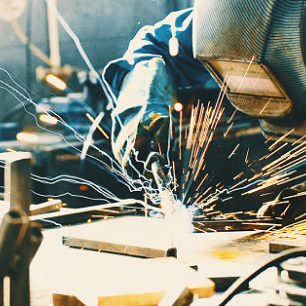Jump to:
5 Professional Welding Certifications to Boost Your Career in 2025
As the welding industry evolves, staying competitive requires not only sharpening your skills but also earning professional welding certifications that confirm your knowledge, expertise, and ability to meet industry standards developed by the American Welding Society (AWS). Whether you’re just starting your welding career or aiming to specialize in advanced techniques, 2025 offers several certification paths to set you apart. Here are five welding certifications to consider:
1. Certified Welder (CW)
The Certified Welder (CW) credential is a strong starting point for welders looking to establish themselves in the industry. This hands-on certification focuses on practical skills, requiring welders to demonstrate proficiency in specific welding processes and positions rather than passing a written exam. Recognized across multiple industries, the CW certification verifies a welder’s ability to meet quality and safety standards in real-world applications, making it a valuable credential for those seeking to prove their technical capabilities.
2. Certified Welding Inspector (CWI)
The Certified Welding Inspector (CWI) certification is essential for welding professionals interested in quality control, compliance, and project oversight. CWIs ensure that welds meet industry codes and safety standards, playing a key role in structural integrity. This highly respected certification opens doors to leadership positions in industries such as construction, aerospace, shipbuilding, and manufacturing. CWIs oversee welding procedures, inspect materials, and verify welder qualifications, making them indispensable in maintaining weld quality and workplace safety. With strong demand across various sectors, earning a CWI credential can lead to career growth and higher earning potential.
3. Certified Resistance Welding Technician (CRWT)
The Certified Resistance Welding Technician (CRWT) certification is ideal for professionals in high-production industries like automotive, aerospace, and electronics manufacturing. It validates expertise in operating resistance welding equipment, conducting weld quality assessments, and troubleshooting production issues. As manufacturers increasingly rely on precision and efficiency, CRWT-certified technicians are in-demand to maintain productivity and ensure weld consistency. This certification sets a recognized standard for resistance welding expertise, giving employers confidence in a technician’s ability to optimize processes and uphold quality standards.
4. Certified Robotic Arc Welding Technician/Operator (CRAW-T/CRAW-O)
Automation is transforming the welding industry, and the Certified Robotic Arc Welding (CRAW) certification validates expertise in robotic welding technology and systems. Certified Robotic Arc Welding Technicians (CRAW-T) program and maintain robotic welding systems, while Certified Robotic Arc Welding Operators (CRAW-O) oversee execution on the production line. This professional certification confirms proficiency in programming robotic welders, ensuring weld quality, and maintaining efficiency in automated environments. As industries continue to adopt robotic welding solutions, CRAW-certified professionals play a crucial role in keeping operations running smoothly and up to standard.
5. Certified Welding Supervisor (CWS)
The Certified Welding Supervisor (CWS) certification is designed for experienced welders moving into leadership and management roles on the shop floor and in the office. CWS-certified professionals oversee welding operations, improve productivity, and ensure adherence to quality standards. This professional certification emphasizes cost control, workflow efficiency, and project oversight, making it an excellent choice for those looking to enhance their career prospects while contributing to operational success. Welding supervisors are vital in optimizing processes, reducing waste, and maintaining high safety and quality standards in welding operations.
Why Welding Certifications Matter
Welding certifications showcase your commitment to excellence and distinguish you in a competitive job market. They validate your expertise, open doors to higher-paying roles, and ensure you remain relevant in an ever-changing industry. Each professional certification path offers unique advantages tailored to different career goals, so it’s essential to align your choice with your interests and aspirations. Whether you’re mastering manual welding techniques or exploring automation, pursuing a welding certification in 2025 is an investment in your future. Take the next step and explore these certifications to forge a successful career in welding at aws.org.


